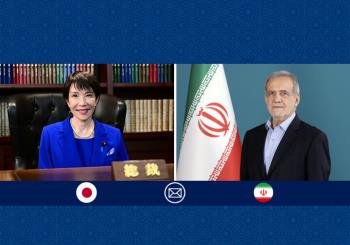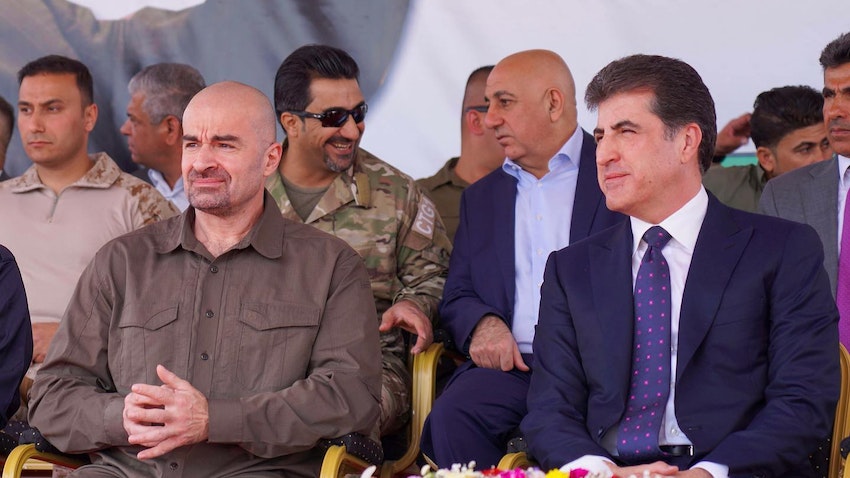Alwaght- While the two power poles in the Iraqi Kurdistan region still insist on their tough stances against each other, their past mechanisms to run the autonomous region and settle internal crises is gradually declining, suggesting that the continuation of these differences could result in breaking the region into two independently administered regions.
Kurdistan Democratic Party (KDP) led by Masoud Barzani holds the capital Erbil and Dehouk provinces. The Patriotic Union of Kurdistan (PUK), led by Bafel Talabani, the son of late President Jalal Talabani, runs Suleimanyah province.
Among the most important issues of difference between the two parties of the Kurdistan region are the amendment of the election law and equalization of all financial incomes, as well as real participation in the administration of the local governing system. In the latest case of these gaps, two months ago, the Deputy Prime Minister of the Kurdistan region Qubad Talabani refused to participate in the cabinet meetings in protest at what he described as the KDP’s “monopolization.” The PUK holds important posts in Erbil’s cabinet, including deputy prime minister, deputy president, speaker of local parliament, as well as ministers of planning, Peshmerga, and higher education.
The major point of dispute between the two parties is the drastic reduction of the budget by the Kurdistan Regional Government (KRG), which has caused the areas under the control of the Patriotic Union of Kurdistan, such as Sulaymaniyah, to suffer a financial crisis and be unable to even pay the salaries of government employees and security forces.
The two parties also have ideological and historical differences. The KDP is a liberal party while the PUK is a social democratic one.
Now, accusing the rival of seeking blackmailing by withdrawing from the local cabinet, the KDP has announced the start of negotiations between the two sides to settle the differences.
On Thursday, Yashtarian Sadeq, a member of the KDP political office, said that the two major parties are planning a meeting on Saturday.
In a press release, he said that the differences between the KDP and PUK are financial and administrative and would not be settled via phone.
“We meet all parties, including the Patriotic Union,” the statement said.
On the other hand, local media reports suggest that Kurdish parties are under pressure from the US and the UN representative to find a way to end their fissures through negotiations. Brett McGurk, the American National Security Council Coordinator for Middle East and North Africa, met with the leaders of the two Kurdish parties during a trip to the Kurdistan region last week to bridge their gaps. The US has a record of mediation between the two parties. In 1998, the civil war ended with Washington’s mediation and an agreement gave birth to the current power sharing model and government.
However, observers question the capability of the initiatives presented to bridge the deepening gaps between the two parties, as past ones failed to end the current impasse. Now, there is a fear that the KDP’s push for an election without yielding to the PUK demands would lead to boycott of the voting by the latter. The PUK may not just boycott the elections but also threaten to withdraw from the government, possibilities that herald Sulaymaniyah’s administrative divorce from Erbil. It seems that this divorce is looming despite efforts by various actors, on top of them the Western countries, to bring their views closer to each other.
The additional challenge of Supreme Court’s ruling
The financial crisis caused by the severe budget deficit has been one of the main reasons fomenting of differences between Kurdish parties over the distribution of the local government budget in recent years.
In the meantime, the KDP, as the leading faction in the parliament and the regional government, hoped to get a share of 12 to 14 percent of the federal budget through advancing the negotiations with the central government to resolve disputes with Baghdad over oil and gas production and exports and their revenues.
Iraq has enjoyed a sharp increase in its income due to the increase in global oil prices in the last year. According to the transactions of the last 11 months, this country has sold over 3.1 million oil barrels per day, and given the average oil price of about $96 per barrel, the total income of Iraq’s oil exports in a full year is around $116 billion.
But while the Kurdish leaders were optimistic that several rounds of talks with Baghdad would conclude, a ruling by the Supreme Court which illegalized granting financial resources to the KRG from federal budget dealt a heavy blow to the Kurdish optimism. Shortly after the ruling, Masoud Barzani attacked the Supreme Court and described its ruling “hostile.”
Now Erbil officials, who find themselves in a predicament, are tacitly threatening to withdraw from Baghdad government coalition, something that can bring forth collapse of the cabinet of Prime Minister Mohammed Shia al-Sudani.
“It is not the amount of money that is meant, but the main problem is the violation of rights and principles. Everyone knows that our participation in the government coalition and the formation of the new Iraqi government was based on this, a clear and detailed program that was agreed upon by all parties,” said Barzani.
Nechirvan Barzani, the KRG president, also described the Supreme Court’s decision as targeting the political process and the agreement based on which the new government was formed.
He said: “The court’s decision is completely unfair. This decision does not only target the salary earners and people of Kurdistan who are Iraqi citizens, but also the general process and political stability and the agreement based on which the new federal government was formed.”
He further argued that Iraq went through a long, complicated and unstable political process until finally a government was born in Baghdad, from which the Iraqi people hoped for a stage of stability and a better future. All expectations were that the Supreme Federal Court of Iraq would protect the interests of all parts of Iraq and take into account the political conditions and not become a tool for sabotaging the opportunity and positive atmosphere created to solve the country’s problems.
On the other hand, other factions that are partners in the government administration coalition have a view different from the leaders of Erbil regarding the Supreme Court ruling. Alia Nassif, a lawmaker from the State of Law coalition, criticized the position of the Kurdistan government regarding this decision and described the ruling as a realization of “social justice”.
“We were surprised by the double standards of the Regional Government in dealing with the Supreme Federal Court’s ruling, the same Court that a couple of days ago made a decision that served the interests of the region’s pensioners. Is the court politicized when it makes decisions in favor of the people of Iraq?,” she was quoted as saying.
Qais Khazali, the secretary-general of the Karaib Ahl Al-Haq, called for respect and commitment to the Supreme Court’s decisions. In a Twitter message, he said: We emphasize that the Iraq’s judiciary is the backbone of the country and we call for respect and commitment to its decisions and reject any circumvention of its decisions and institutions.”
Walid al-Sahlani, a lawmaker from Fatah parliamentary bloc— one of the most prominent blocs forming the Shiite Coordination Framework (SCF) — in opposition to the Kurdish reaction described the Supreme Court as a “safety valve” that protects democracy and popular unity.
In the middle of such situation, it seems that threatening to wreak the political process would not work for the Kurdish leaders and the Kurdistan region’s political conditions remain suffering from ongoing crisis among the parties and the confusion of leaders in their struggle to respond to the economic and social discontentment.



























